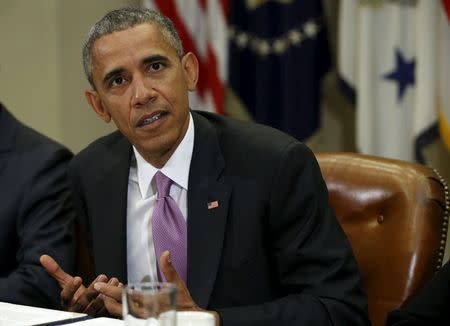Supreme Court to review U.S. electricity market efficiency rule

By Lawrence Hurley WASHINGTON (Reuters) - The U.S. Supreme Court agreed on Monday to review the legality of an Obama administration regulation aimed at encouraging efficiency in the electricity market by having electrical grid operators pay users to reduce consumption at peak times. The court said it will hear an appeal filed by the U.S. Federal Energy Regulatory Commission seeking to reverse a May 2014 ruling by the U.S. Court of Appeals for the District of Columbia Circuit that threw out the rule. The regulation, aimed at improving grid reliability and encouraging clean energy, remains in effect as the litigation continues. FERC chairman Norman Bay said in a statement that the program is "important to the nation's competitive wholesale electricity markets and reliable electric service." The regulation concerns what FERC calls "demand-response," which is when, in an attempt to manage demand for electricity, regional electrical grid operators agree to pay electricity users to cut consumption at peak times. The brief court order noted that Justice Samuel Alito will be recused in the case, meaning only eight justices will participate. The court did not give a reason. The Electric Power Supply Association, other trade groups that represent utilities and PPL Corp challenged the regulation. They would lose out if the regulation is allowed to stay intact because it is likely to reduce demand for electricity generation. Some utilities and companies like EnerNOC Inc that have developed products to help customers lower electricity usage had backed the government's appeal, as did companies like aluminum producer Alcoa Inc that can benefit from the payments. Environmental groups also back the rule, saying it helps promote renewable energy sources and reduce air pollution by making the electricity market more flexible and limiting demand for electricity generation. The case does not directly affect the Obama administration's separate plan to regulate carbon emissions from power plants. The 2011 FERC order set the methodology that wholesalers had to use to calculate the compensation, saying it must be the same as the payments made to electricity generators. The appeals court said FERC, as a federal agency, had no authority to do so because "demand-response" is an issue that should be dealt with by state regulators. The Electric Power Supply Association's members include Exelon Corp and Dynegy Inc. Also challenging the regulation is utility group Edison Electric Institute, which represents such companies as Entergy Corp and Southern Company. The court will hear arguments and rule on the matter in its next term, which begins in October and ends in June 2016. The two related cases are FERC v. Electric Power Supply Association, U.S. Supreme Court, No. 14-840 and EnerNOC Inc v. Energy Power Supply Association, U.S. Supreme Court, No. 14-841. (Reporting by Lawrence Hurley; Editing by Will Dunham)

 Yahoo News
Yahoo News 